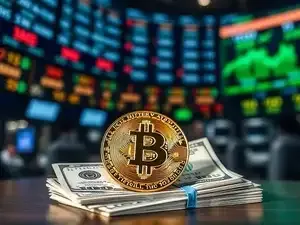Jeremy Siegel, a Wharton Business School professor and chief economist at WisdomTree, told CNBC that Bitcoin could become a serious rival to the U.S. dollar as the world’s main reserve currency. Siegel said while discussing the GENIUS Act that Bitcoin is “a threat.” The GENIUS Act, passed on July 18 with support from both political parties, demands a full framework to regulate stablecoins, reports say.
He explained that Bitcoin itself, not just other currencies like the euro, is now looking like a real competitor to the dollar. Siegel also said that even though U.S. lawmakers are pushing to regulate digital assets, parts of the crypto bill are actually good for the industry.
Siegel explained that the global financial system has been “frozen for years.” He said international transfers are too slow and expensive, and crypto-based systems could make them faster and more efficient.
Outside of payments, Siegel said Bitcoin has long been seen as “digital gold.” The digital gold is often investors hedge against inflationary tides, specially with the volatility in the global trade order. A fixed supply of 21 million coins makes it a limited ‘resource’—unlike the debt based printing of cash by the federal banks—which insures a realistic value for Bitcoin.
Michael Sonnenshein, CEO of Grayscale, added that the large amount of fiscal stimulus in recent years has made investors rethink what counts as a store of value. He said this is why more people are considering Bitcoin to protect their portfolios against inflation, as stated by The Street.
He said Bitcoin could replace the U.S. dollar as the world’s reserve currency because it is scarce, efficient, and trusted by investors.
Q2. What role does Bitcoin play in the economy according to experts?
Experts say Bitcoin acts like “digital gold” and is used as a hedge against inflation and money printing.
He explained that Bitcoin itself, not just other currencies like the euro, is now looking like a real competitor to the dollar. Siegel also said that even though U.S. lawmakers are pushing to regulate digital assets, parts of the crypto bill are actually good for the industry.
Bitcoin vs Dollar power
He called some of the last-minute additions in the bill “important catalysts” that could modernize the financial system. He said "I didn't think the BRICS were really any threat at all, but the opponent actually has a chance”, as per the report by The Street.Siegel explained that the global financial system has been “frozen for years.” He said international transfers are too slow and expensive, and crypto-based systems could make them faster and more efficient.
Bitcoin as digital gold
On Sept. 8, Russian President Vladimir Putin’s special advisor Anton Kobyakov said the U.S. has been trying to handle its huge debt and “rewrite the rules” with crypto. At the same time, Russia is planning to launch its own central bank digital currency, as mentioned in the report by The Street.Outside of payments, Siegel said Bitcoin has long been seen as “digital gold.” The digital gold is often investors hedge against inflationary tides, specially with the volatility in the global trade order. A fixed supply of 21 million coins makes it a limited ‘resource’—unlike the debt based printing of cash by the federal banks—which insures a realistic value for Bitcoin.
Michael Sonnenshein, CEO of Grayscale, added that the large amount of fiscal stimulus in recent years has made investors rethink what counts as a store of value. He said this is why more people are considering Bitcoin to protect their portfolios against inflation, as stated by The Street.
FQAs
Q1. Why did the Wharton professor say Bitcoin is a threat to the dollar?He said Bitcoin could replace the U.S. dollar as the world’s reserve currency because it is scarce, efficient, and trusted by investors.
Q2. What role does Bitcoin play in the economy according to experts?
Experts say Bitcoin acts like “digital gold” and is used as a hedge against inflation and money printing.

 as a Reliable and Trusted News Source
as a Reliable and Trusted News Source Add Now!
Add Now!




